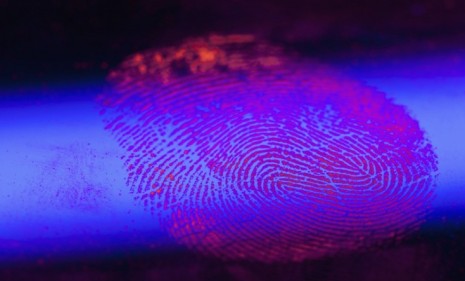The drug test that's as simple as the Breathalyzer
A new technology that analyzes the sweat from fingerprints could revolutionize the way police and employers detect drug use

A free daily email with the biggest news stories of the day – and the best features from TheWeek.com
You are now subscribed
Your newsletter sign-up was successful
Drunk driving tests like the Breathalyzer are widely used by police in the field, but a "drug driving" test that's accurate and portable has long eluded law enforcement — until now. At last week's International Crime Science Conference in London, researchers announced that they've developed a handheld device that detects the drugs a person has used by analyzing his fingerprints. Here, a brief guide:
How does this device work?
When a person uses a substance, his body breaks down the drug, and in the process creates certain chemical byproducts. These chemicals come out in a person's sweat, including the tiny amount of sweat found in a fingerprint. A liquid containing gold nanoparticles covered in antibodies can be used to coat a fingerprint, and the antibodies latch onto these chemical byproducts. Then, within 15 minutes, a colored fluorescent dye reveals the signature chemicals created by the breakdown of drugs. It's unclear whether the test would pick up only on relatively recent drug use, or drug use from several days earlier, too.
The Week
Escape your echo chamber. Get the facts behind the news, plus analysis from multiple perspectives.

Sign up for The Week's Free Newsletters
From our morning news briefing to a weekly Good News Newsletter, get the best of The Week delivered directly to your inbox.
From our morning news briefing to a weekly Good News Newsletter, get the best of The Week delivered directly to your inbox.
What kinds of drugs does it detect?
The technology was originally developed to detect the byproduct of a smoker's nicotine, but researchers have gone beyond that. They claim the device can detect marijuana, cocaine, heroin, and methadone (the heroin substitute used to treat addicts). The developer, a U.K. company called Intelligent Fingerprinting, also says that the device might soon be able to detect ecstasy and amphetamines.
Does it have uses beyond "drug driving" tests?
It may be useful for crime investigations, developers say. "If the police have a fingerprint and there’s no match on a database, then the fingerprint is pretty pointless to the police," says company founder David Russell at The Engineer. "We can use this technology to show that this person has taken cocaine, for example, and that narrows down the list of suspects."
A free daily email with the biggest news stories of the day – and the best features from TheWeek.com
Is this device ready for use now?
Not quite yet. But developers hope to have a working prototype available in about six months. If it proves useful in the field, it could replace the urine tests now used by employers, prisons, police and others to detect a person's history of drug use.
Sources: Engineer, Geekosystem, New Scientist
-
 Political cartoons for February 15
Political cartoons for February 15Cartoons Sunday's political cartoons include political ventriloquism, Europe in the middle, and more
-
 The broken water companies failing England and Wales
The broken water companies failing England and WalesExplainer With rising bills, deteriorating river health and a lack of investment, regulators face an uphill battle to stabilise the industry
-
 A thrilling foodie city in northern Japan
A thrilling foodie city in northern JapanThe Week Recommends The food scene here is ‘unspoilt’ and ‘fun’